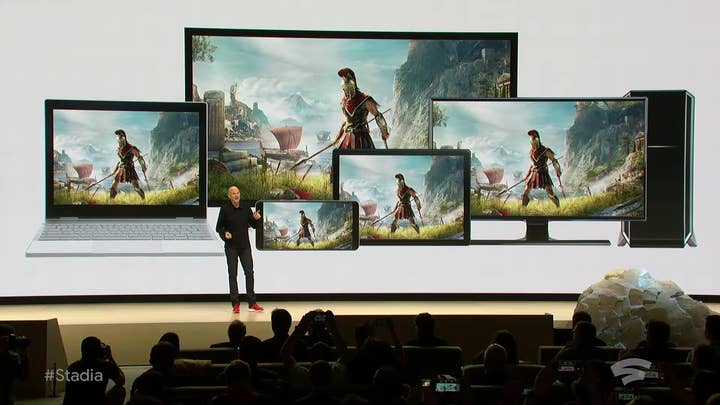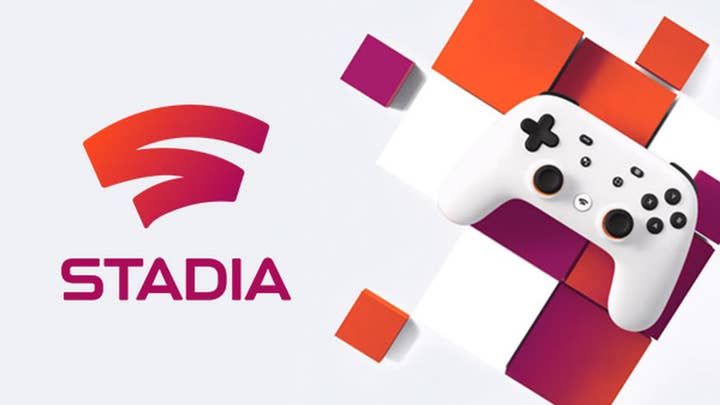Google Stadia's stealth launch does not inspire confidence | Opinion
After its bombastic announcement, Stadia's low-key and poorly communicated launch will fuel suspicion that it's another of Google's passing fads
If you've been running out to buy a black mourning outfit every time the Death of Games Consoles, PCs or any other gaming platform has been proclaimed, bad news; it's another one for the mothballs, it seems. Having drawn gasps from bystanders and mild panic from shareholders when it was originally unveiled, Google's Stadia -- the game streaming service that's meant to be a nail in the coffin of the quaint idea of just running a game on a cheap piece of consumer hardware you bought in a shop -- is arriving in less than four weeks.
Yet for all the hoopla around its unveiling, Stadia's launch is a strangely muted affair. The chorus of the doom prophets is nowhere to be heard. The inexorable approach of the streaming black hole that will swallow gaming within its event horizon appears to make scarcely a sound.
"For all the hoopla around its unveiling, Stadia's launch is a strangely muted affair"
Alright, I'm over-egging it slightly, but it is honestly peculiar that with less than a month to go before the supposed entry of one of the world's biggest tech firms (indeed, one of the world's biggest companies full stop) into the games business, the launch is making hardly a ripple on the water. It feels like an inordinate amount of the anticipation for Stadia is contained within the rather rarefied bounds of the investor community, many of whom are seeing this as a landscape-altering event on a par with Microsoft's market entry all those years ago. On the consumer front though, and even among developers, the response to Stadia is far more measured -- "wait and see" appears to be the order of the day.
We might be waiting for a while before there's much to see. A scant few weeks from launch, Stadia's initial roll-out remains limited in scope. Even accessing Google's stadia.com page from Japan, for example, simply redirects you to a Google hardware page without a single mention of the service; not so much as an explanation or a "coming soon," which even considering the nightmare Microsoft famously had in this territory feels like a bit of an oversight in a market that does buy rather a lot of games.
The dedicated hardware being launched with the platform also appears to be a low priority. People who signed up for the "founders" type hardware packs may not even get their systems on November 19, it seems, with hardware instead being distributed over an undefined period post-launch -- a somewhat shabby way of treating the consumers most excited about a platform that hasn't excited very many people, and something that feels far more like a poor effort at inventory management on Google's part than a struggle with unexpected levels of demand.
There are of course some decent reasons for rolling out a service offering like this a bit more slowly than you'd launch a new console hardware platform -- not least of which being that it's much easier to keep your service offering consistent and online when you ramp up slowly, rather than opening the floodgates and seeing your infrastructure collapse. Google, though, is one of the biggest players in cloud computing -- second only to Amazon -- which makes it unusual that the balance is tipped so heavily towards being the softest possible launch.
"The notion that Stadia is a 'Netflix for Games' is still deeply ingrained in the collective psyche"
Then again, there's not actually that much for Google to make noise about around this launch. The company has attracted some exceptional talent to its games venture, but it feels like it did so rather late in the day. In her interview with this site earlier in the week, Jade Raymond said some fascinating things -- and perhaps more importantly, some very sensible and grounded things -- about the ideas she wants first-party development for Stadia to explore, but should we really still be at the stage of musing about the conceptual possibilities of cloud-based games when the cloud-based game service itself is going to be asking people to start forking over cash in three weeks?
Therein, I think, lies the rub. There are all sorts of excuses we can make about a strategy of gradually building up from a soft launch, or how this kind of service offering doesn't need to be splashy from the outset and can gather speed over months or even years -- and some of that is absolutely true -- but the on-the-ground reality is that Google is going to be asking people for money from the outset, and what they're offering thus far looks to be of deeply questionable value. Worse, the value of the offering still seems to be a source of some really basic confusion among not just consumers, but media commentators and investors too, with the notion that Stadia is a "Netflix for Games" still deeply ingrained in the collective psyche.

The reality of Stadia is, for the most part, not a library to which you subscribe for unlimited access, but rather a purchase or rental service that changes little about the underlying business model and merely trades one set of limitations (the need to download or physically acquire a game before playing, and to have a console or PC with you when you want to do so) for another (the need to have a very high speed, uncapped broadband connection at any location where you wish to play). That doesn't appear to have been very effectively communicated thus far, and the consequence is likely to be some disillusionment from consumers who are expecting something quite different.
"For potential content partners and consumers alike, what Google may be seeing as a soft launch is something quite different"
Between the lack of hype building around the launch (which honestly feels like it's happening now just to keep the promise of hitting a 2019 date, even if the service isn't really ready for prime-time until next year), the odd failure to deliver pre-ordered hardware on time, the confusion over the business model, the vague and distant nature of first-party support and the utterly inevitable technological issues many users will face (and will be very, very noisy about online, you can be sure), it's hard to see how Stadia doesn't have a pretty bumpy start to its life.
Which, you might say, is fine if the plan has always been for a soft launch and a gradual build up, but all the fine talk of a gradual build-up has to come with a few pinches of salt when we recall that Google is a company with a famously terrible attention span and no track record whatsoever of sticking with bets that don't start paying off in the short-term. Developers will be evaluating which baskets they want to stick their eggs into, and Google's internal politics will no doubt have a few knives out as well; if Stadia's early word-of-mouth is poor and initial uptake is disappointing, the promise of a system supported by Google's practically limitless financial clout may evaporate pretty rapidly.
If any of this feels like I'm saying "Google should have spent more time learning how traditional console launches work, and why" -- and thus ignoring the terribly exciting new-technology, new-paradigm aspects of all this -- well yes, that's exactly what I'm saying. New technology and new paradigms are all very well, but there's a reason that strategies for marketing, promoting and launching new platforms have evolved in the way they have, and much of that is down to consumer psychology and an understanding of how vital momentum is to a platform, not specific to (or invalidated by) any given technological approach. Google may not want Stadia to be seen as a console launch or evaluated in those terms, but both the industry and consumers are going to base their judgements on many of those same metrics -- and thus far there are few signs that Stadia is going to measure up.
This, too, isn't new territory for Google. The company has struggled mightily with its hardware efforts in general, not least because it's often willfully insisted on "disrupting" market realities around sales, marketing and distribution without properly taking the time to understand the reasons for those realities. Hence, for example, Google building some of the best smartphones in the world yet managing only a miserable trickle of sales for them. There are plenty of traps in Google's own recent track-record into which Stadia might fall, and it would be naïve to think that developers and publishers aren't keenly aware of those even as they eye the Silicon Valley giant's potential first- and second-party development coffers.
For both those potential content partners and consumers alike, what Google may be seeing as a soft launch is something quite different. It's a chance to watch carefully for signs of whether Stadia is really a commitment, or just another expensive, hare-brained scheme that'll fall by the wayside as soon as the C-suite loses interest. For such a quiet launch, next month's arrival has a great deal to prove.

